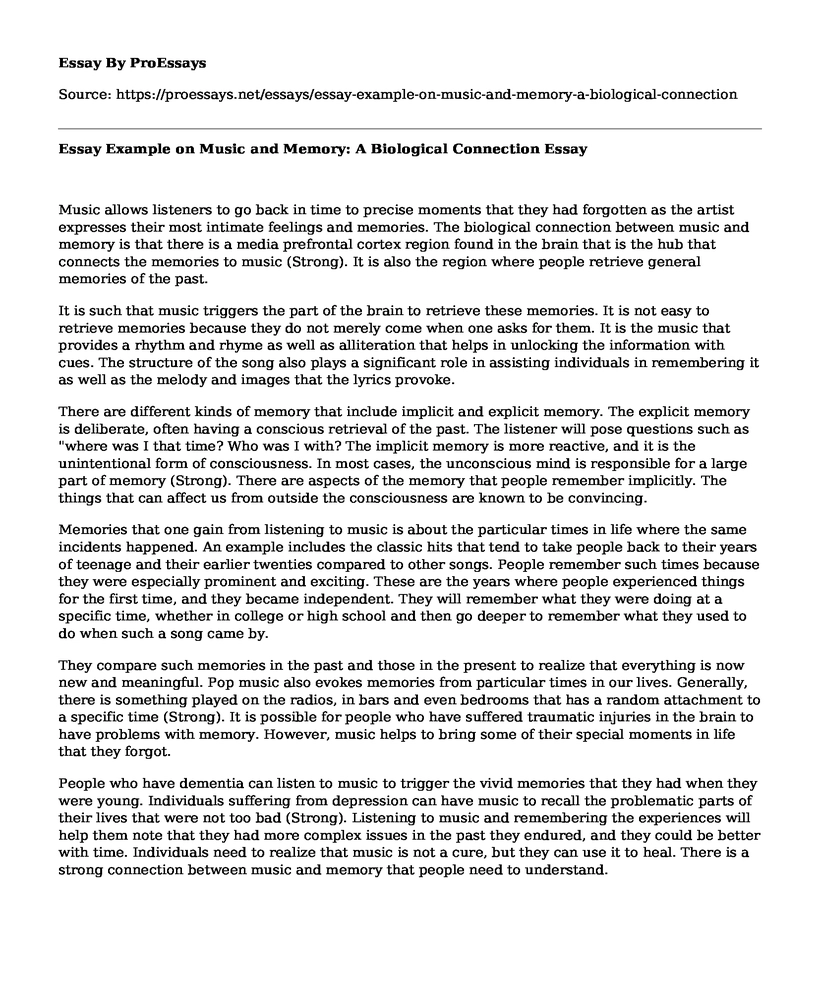Music allows listeners to go back in time to precise moments that they had forgotten as the artist expresses their most intimate feelings and memories. The biological connection between music and memory is that there is a media prefrontal cortex region found in the brain that is the hub that connects the memories to music (Strong). It is also the region where people retrieve general memories of the past.
It is such that music triggers the part of the brain to retrieve these memories. It is not easy to retrieve memories because they do not merely come when one asks for them. It is the music that provides a rhythm and rhyme as well as alliteration that helps in unlocking the information with cues. The structure of the song also plays a significant role in assisting individuals in remembering it as well as the melody and images that the lyrics provoke.
There are different kinds of memory that include implicit and explicit memory. The explicit memory is deliberate, often having a conscious retrieval of the past. The listener will pose questions such as "where was I that time? Who was I with? The implicit memory is more reactive, and it is the unintentional form of consciousness. In most cases, the unconscious mind is responsible for a large part of memory (Strong). There are aspects of the memory that people remember implicitly. The things that can affect us from outside the consciousness are known to be convincing.
Memories that one gain from listening to music is about the particular times in life where the same incidents happened. An example includes the classic hits that tend to take people back to their years of teenage and their earlier twenties compared to other songs. People remember such times because they were especially prominent and exciting. These are the years where people experienced things for the first time, and they became independent. They will remember what they were doing at a specific time, whether in college or high school and then go deeper to remember what they used to do when such a song came by.
They compare such memories in the past and those in the present to realize that everything is now new and meaningful. Pop music also evokes memories from particular times in our lives. Generally, there is something played on the radios, in bars and even bedrooms that has a random attachment to a specific time (Strong). It is possible for people who have suffered traumatic injuries in the brain to have problems with memory. However, music helps to bring some of their special moments in life that they forgot.
People who have dementia can listen to music to trigger the vivid memories that they had when they were young. Individuals suffering from depression can have music to recall the problematic parts of their lives that were not too bad (Strong). Listening to music and remembering the experiences will help them note that they had more complex issues in the past they endured, and they could be better with time. Individuals need to realize that music is not a cure, but they can use it to heal. There is a strong connection between music and memory that people need to understand.
Work cited
Strong, Catherine. Grunge: music and memory. Routledge, 2016. Retrieved from http://www.popular-musicology-online.com/issues/review%20articles/wright_strong.html
Cite this page
Essay Example on Music and Memory: A Biological Connection. (2023, Apr 09). Retrieved from https://proessays.net/essays/essay-example-on-music-and-memory-a-biological-connection
If you are the original author of this essay and no longer wish to have it published on the ProEssays website, please click below to request its removal:
- Movie Analysis Essay on Pink Boy and Growing Up Trans
- Essay Sample on Old vs New: How Broadcasting is Impacting Electronic Media
- Photosynthesis and Respiration Report
- Goffman's Deviance, Stigma, and Social Order - Essay Sample
- Essay Sample on Kim Kardashian: A Global Cultural Icon
- Multicultural Counseling: Essential for Effective Counseling - Essay Sample
- Essay Example on Spotify: From Piracy to a Billion-Dollar Music Streaming Giant







